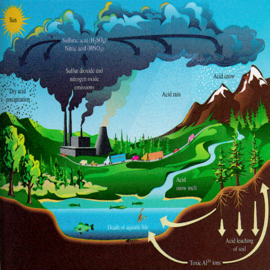
We are currently in a situation where the planet’s ecological structure is not coping with all the pollution because of a huge, continuously increasing, consumer demand. This excessive demand for consumer products has created most of the current ecological imbalances. These imbalances will become a much greater problem than most people expect this to be. These imbalances have already caused ecological disasters in different places all over the world, with many more to follow.
This rate of consumption is increasing at an alarming rate. This will cause enormous ecological devastation in the future, to the extent that around 2025, people will need to complete major changes in their lifestyles to avoid the worst possible scenario.
The greenhouse gas effect is now so severe that around 2015, the whole planet will experience the result of rising temperatures in a far more severe way than most will expect.
While most people have begun to notice that the weather is changing they may not have understood that these climate changes are the beginning of a much more serious problem. As a result most people are not changing their lifestyles, reducing their ecological footprint, resulting in a further increase of the present ecological imbalance.
With the ever continuing increase in environmental damage there will come a time where this will reach a point of no return, whereby the planet will no longer be able to support its own functioning. It is expected that by 2025, the planet will no longer be able to cope with the severe ecological damage. This will mainly be caused due to present geological stresses, further increase of global warming, and further destruction of the planet’s ecology which is so needed by the planet to provide support for its overall functioning.
It is of benefit for people to look at how they live their life and what they can do to change their lifestyle, so that an excessive need for goods and products will not become a major drive in one’s life. This may be difficult to do while the overall consensus is to buy more products. However, this is not reducing consumerism. At times, products may be needed to improve a lifestyle; however, people often wish to increase their buying and spending power and buy more products so they can feel better or can keep up with others. Thus, this need for an increase in products in the household creates an increase in the number of products manufactured, which in turn often results in an increase in environmental damage.
While humanity needs consumer goods, the impact these products or the production processes can have on the ecology has to be reduced. To save the environment humanity can no longer continue to increase its consumption of goods and, this should therefore not be encouraged. The human race needs to envisage a future whereby people still have their comforts but without the throw-away and polluting aspects of living, as is happening in most modern-day societies.
It is important that the planet’s worsening environmental crisis is taken seriously and action is taken to make adequate change to prevent a looming ecological crisis within the next twenty years. A simpler, less polluting lifestyle will result in a more manageable, sustainable environment, which as a result can function better as a support structure for the planet’s overall functioning.

Source by Mia Den Haan
 Vitamin Agent The Health & Naturalistic Source
Vitamin Agent The Health & Naturalistic Source





